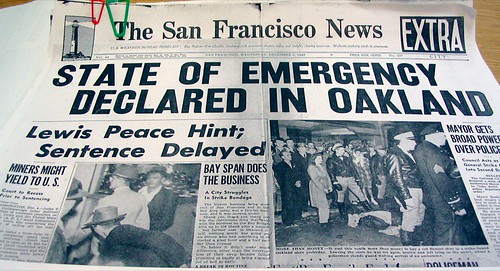
General Strike! The photo at right shows police milling around an injured shopper in front of a struck Oakland department store. Headline at left refers to a nationwide coal miners strike. This clipping is from the Labor Archives and Research Center at SFSU.
Someone with my politics (anarchist, idealist) tends to think of the general strike as a kind of labor-movement Excalibur, whose ass-kicking powers were so great that it could blind King Arthur's enemies simply by being drawn from its scabbard. (In this problematic analogy, King Arthur = The People.)
A general strike is the ultimate exercise of worker solidarity and worker power and basically, it happens like this: everyone (well, almost everyone), in every industry, stops working until their collective demands are met. One hopes that their demands go beyond asking for better pay or other simple benefits, and begin to address the big problems that go with a society where a few people own everything and do nothing, and others own nothing and do all the work.
And if that is your idea of the purpose and potential of general strikes, then it's clear that they haven't been very successful. Part of the problem though might be that there isn't always a clear purpose, even if there is a lot of potential. In the case of Oakland's 1946 general strike, we had an unbelievable potential power. I'm not so clear on the purpose.
I have so much to say about the Oakland strike, I'm going to split this into a few entries. Here's part 1, the context:
The Bay Area had gained half a million people between 1940 and 1945, when immigrants from around the country flooded in to find work in the war industries (mostly shipbuilding) centered here. The East Bay was so packed, there was nowhere to put everyone. I love the image in Marilyn S. Johnson's book The Second Gold Rush, a quote from an Oakland police captain saying in 1942, "Hundreds of men, women, and children [are] sleeping nightly on outdoor benches in public parks, in chairs in all night restaurants, in theatres, in halls of rooming houses, in automobiles, even in the City Hall corridors." Even with so many people, there were labor shortages. Between the shipyards and the businesses that supported them, there was an almost insatiable need for workers.
But a year after WWII ended, Oakland's economy had already started to wobble. Soldiers came back to a new and newly crowded Bay Area looking for jobs just as the war industries were beginning to contract. And the population boom and economic stressors weren't the only pressures. The need for labor had overruled some long standing social and political rules here and everywhere, most obviously, many more women, including for the first time middle class women, started working in factories and other industries. And Black immigrants to the Bay started to integrate the segregated neighborhoods and jobs here. Returning soldiers too had been transformed by their battlefield experiences. Maybe they expected to be able to make changes that hadn't seemed possible before.
Working conditions hadn't been great during the war, but most unions had signed patriotic No Strike pledges. After the war, business leaders and government officials found it impossible to stuff a broadening political agenda back into a box. In '46, a massive strike wave spread around the country (and internationally). The rail and coal mining industries were debilitated by strikes that year, and a number of cities held general strikes.
I found a newsreel that nicely captures the panic that industrialists felt about the rail strike at archive.org.
In this context, of a country and world that was changing by the second, where worker power seemed possible and real, and let's face it, where communists were all over the place, the idea of shutting down a city wasn't just a fantasy. At least, that's what I understand from what I've read.
Next time I'll post about the strike itself. I've got some links to original accounts and a nice documentary too. Stay tuned.

3 comments:
The newsreel is a nice touch. I wish symphonic upsurge was still a feature of the nightly news.
Keep on truckin' with your leftist lowdown, my friend. It looks great.
Great work, Flx! Super outstanding newsreel!
It's pretty crazy to think about a general strike happening here today. Seems truly impossible, but it's still interesting to consider the possibilities. Maybe THAT'S our screenplay, heh heh.
I know that I would find it hard to be on the leading edge of a general strike. I definitely don't feel like I have enough protections at work, and I could use a union and plenty of other stuff, but at the same time, my boss is a sole proprietor of a small business, not a corporation. Hmmm...
Post a Comment